Find The Best Amazon Keywords
Discover Profitable Keywords
Find high-volume, low-competition keywords to boost your product rankings and visibility.
Find the best keywords for your Amazon products
Not sure what people are typing into the Amazon search bar to find the products you sell on Amazon? No problem with our free Amazon keyword tool.
You can use the feature Get Keyword Ideas of our Amazon keyword tool and type in a seed keyword to get hundreds of keyword ideas... or you can search for the keywords other Amazon products are ranking for. For the latter one, type in the ASIN of any Amazon product and see all the keywords this product is ranking for on Amazon.
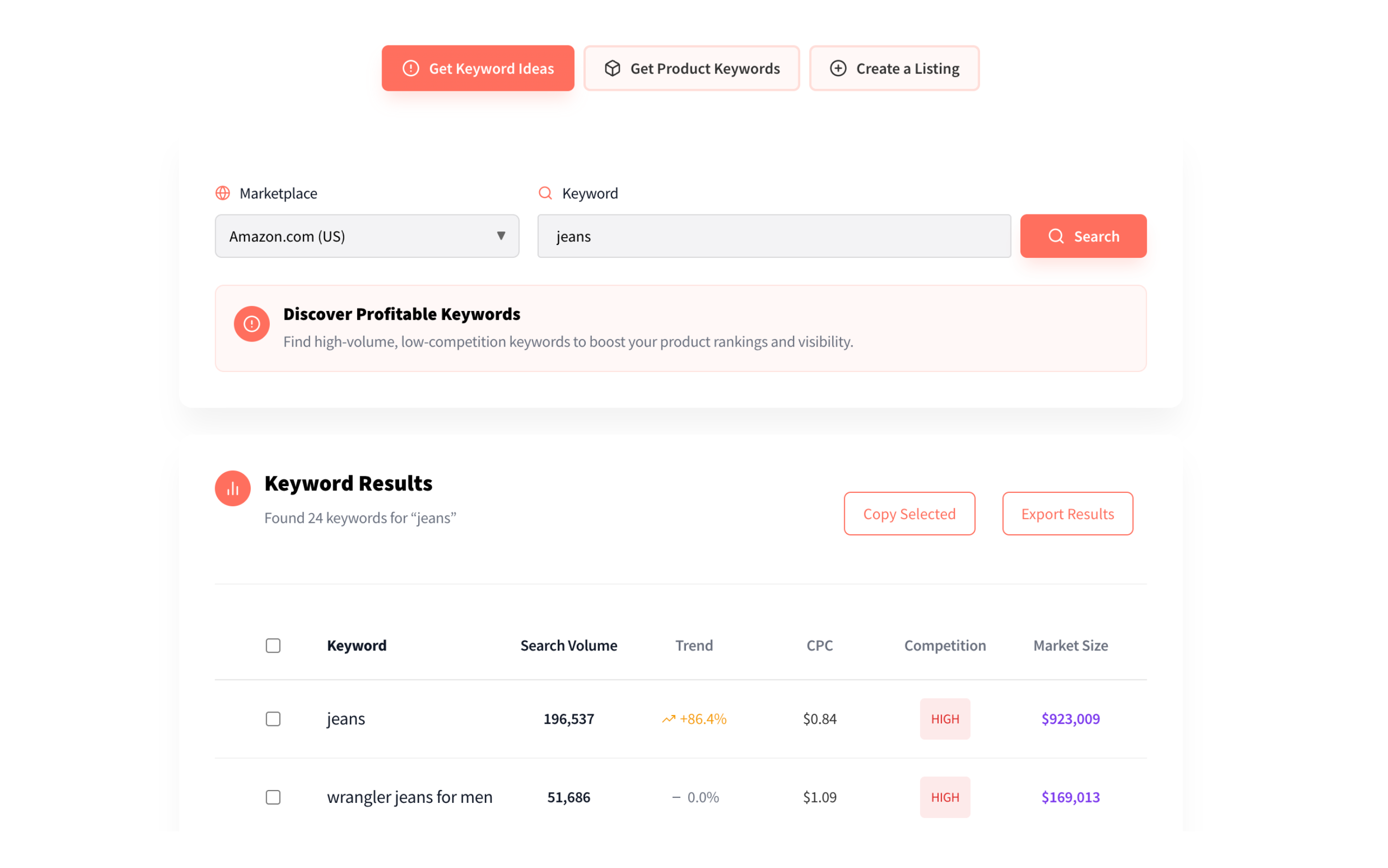
Along with each keyword, you will get detailed search volume, competition levels, trend data and CPC values. No matter if you want to plan your future keyword strategy or optimize your running PPC campaign, our Amazon keyword tool is by far the most comprehensive free keyword tool for Amazon sellers.
Get accurate metrics to find high potential keywords
If you want to succeed on Amazon, you need to find keywords with low competition and high conversion rate. Imagine you are selling a blue drinking bottle. People who are searching for a blue drinking bottle will probably be more likely to buy your product than people who are basically searching for a drinking bottle.
Use our tool wisely and try to find as specific Amazon keywords as possible, because those will be the keywords that actually bring your business customers.
On top of that, use our metrics to find keywords with low competition. For example, you should check out the competition levels of keywords using our competition indicator. This indicator will show you whether a keyword has "Low", "Medium" or "High" competition. A good starting point for your Amazon keyword research.
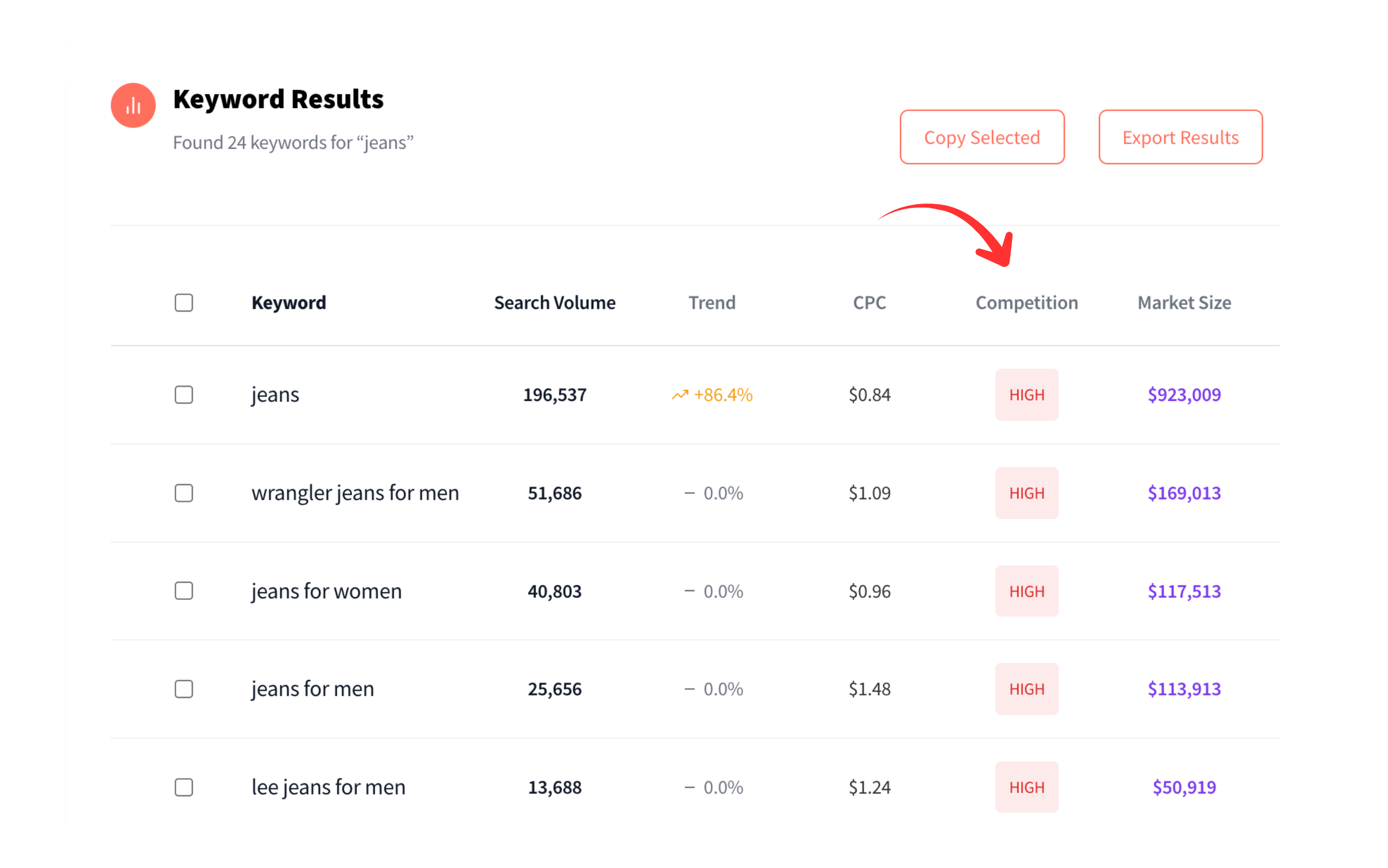
Get accurate data for keyword search volume
If you are looking for Amazon keywords, you obviously want to know how often these keywords are being searched every month. A keyword that is only searched 10 times per month might mean less to your business than a keyword that is being search 100 or 1000 times per month.
And not only the search volume needs to be important for you as an Amazon seller. Also the market size is important for your business. If a keyword does not generate any sales, it does not matter for your business. You need to make sure that the keywords you are using have a decent market size and generate sales. You can therefore take a look at our market size indicator.
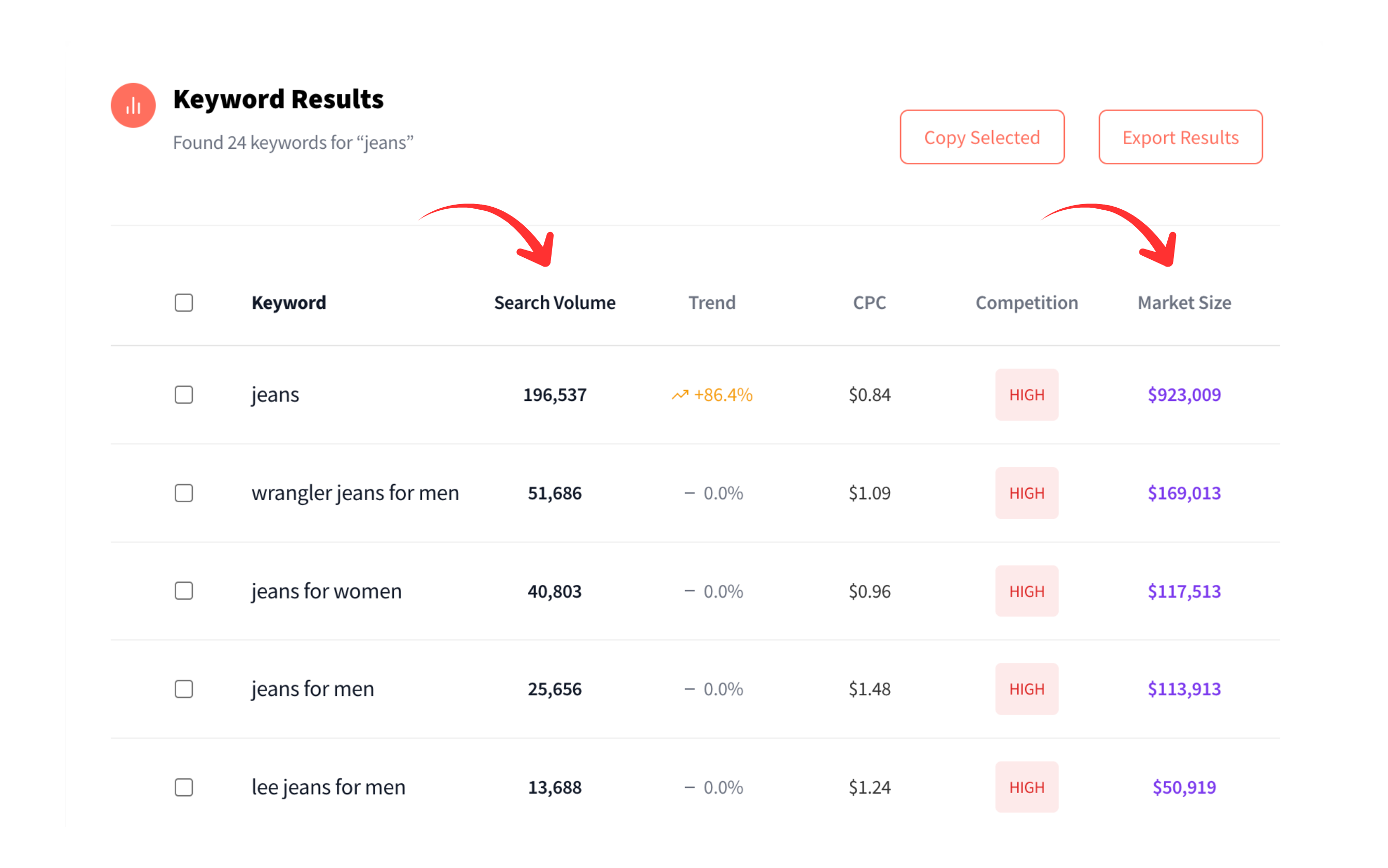
Find the keywords your competitors are ranking for
With our Amazon keyword tool, you can not only find keywords based on one seed keyword. You can also find the keywords that your competitors are ranking for on Amazon. All you need is to type in the ASIN of an Amazon product and the tool will give you all the keywords this product is ranking for on Amazon.
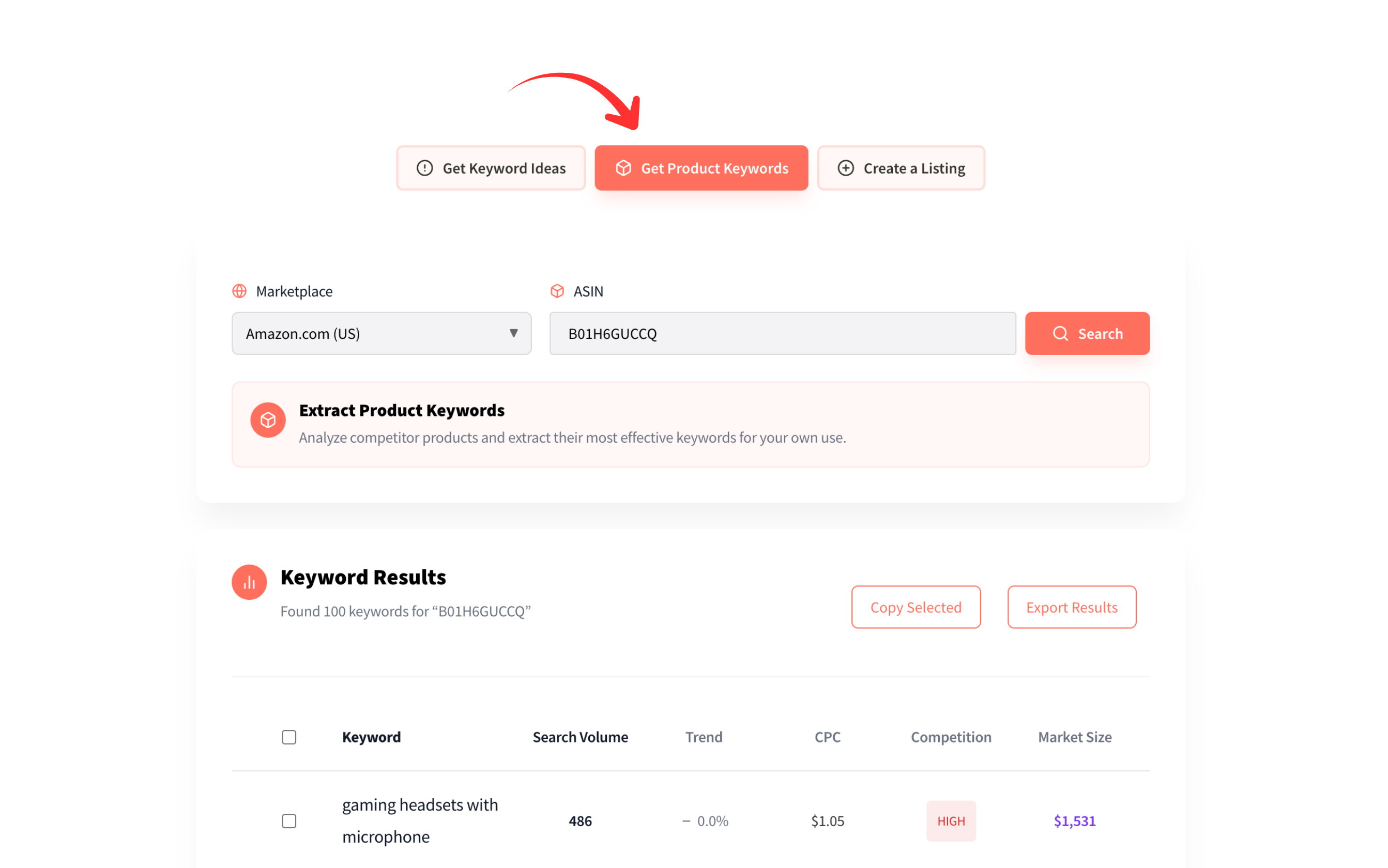
Do Amazon keyword research for nearly every marketplace
Your business does not need to be limited by borders. Whether you are scaling your Amazon business in established markets like the US, or breaking into emerging markets, our Amazon keyword tool provides the data you need.
With support for 22 Amazon marketplaces, our tool empowers you to gain a competitive edge by finding what customers are searching for on Amazon, no matter where they are located in the world.
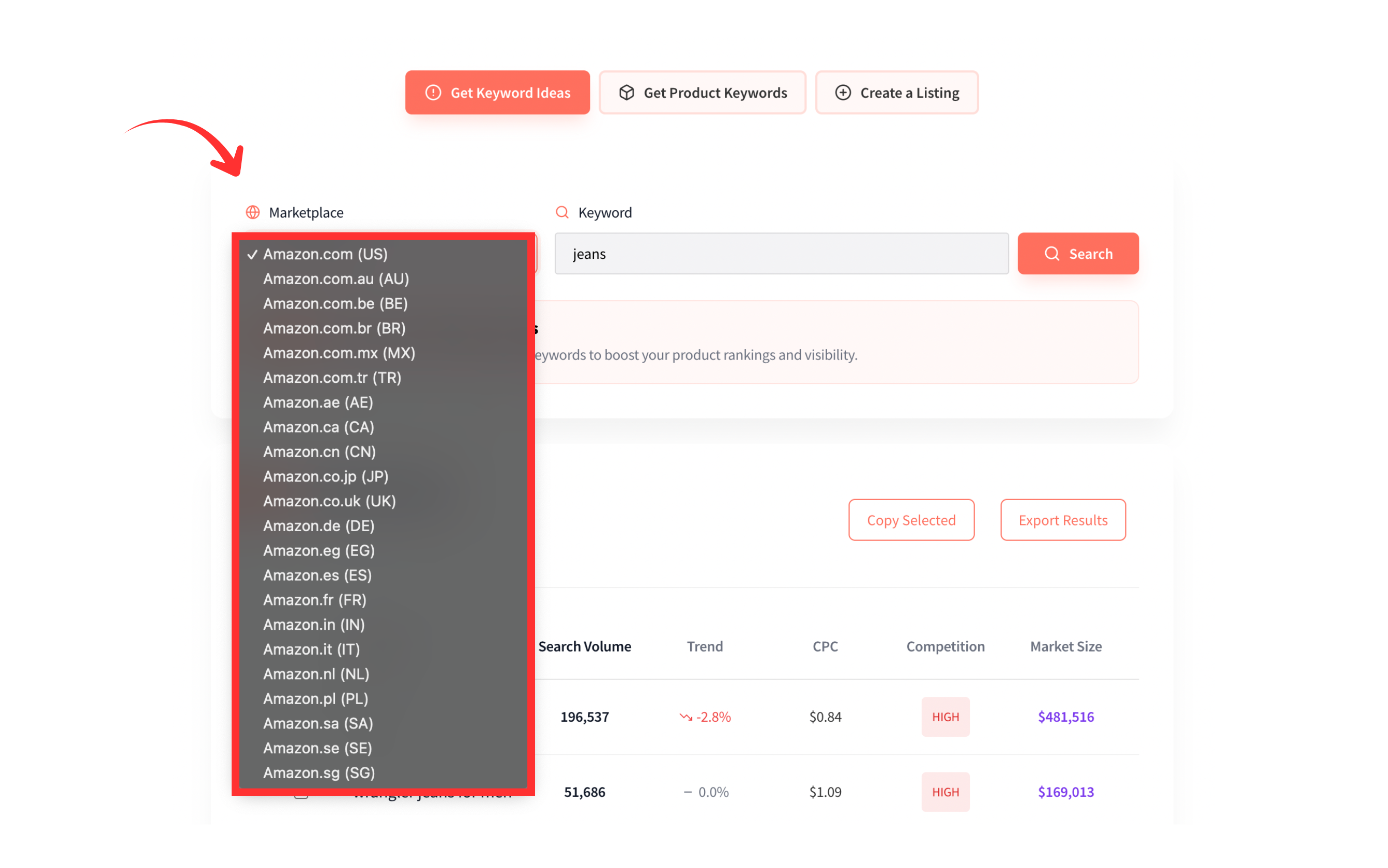
Export the keyword results for your searches
Never lose valuable insights again. With our integrated export feature, you can save your keywords for future strategy sessions or seamlessly bridge your workflow by exporting results to other third-party tools.
Whether you need a specific selection or all your researched keywords, you have two options: simply tick your preferred keywords for a custom export or download the full list in one single click.

Optimize your listing titles, description and bullet points
You cannot only find keywords with our Amazon keyword tool. No matter if you need a new product title, a product description or bullet points for your listing, you can use our listing generator to generate all of these.
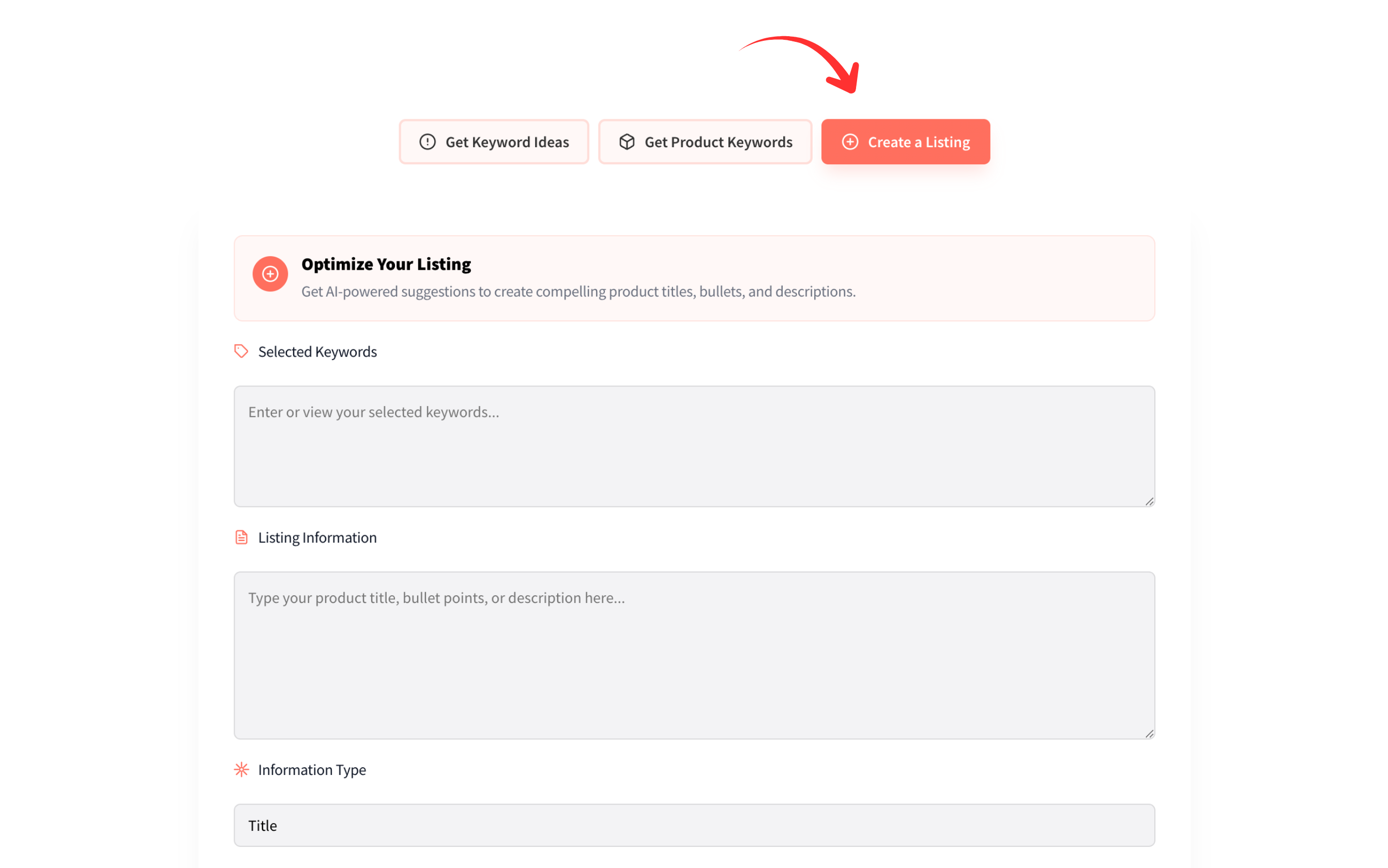
All you need to do is to select a few keywords you want your content to be optimized for and type in some other information about your product. Then, let the tool do your work and get a fully optimized title, description or bullet points.
Our Blog
Discover our guides and software reviews.

Helium 10 Coupons « Up to 20% Discount [March 2026]
Helium 10 is a useful tool for Amazon sellers who wish to grow their business. Although they offer a free…

Helium 10 Magnet: How To Find Keywords [2026]
An optimized Amazon Listing starts with comprehensive keyword research. You need to ensure that your keywords have decent search volume,…

Jungle Scout Review: The Ultimate Guide for 2026
Starting an Amazon business feels like navigating a maze. With millions of products competing and new sellers joining daily, finding…

We Analyzed 600+ Amazon Listings for AI Content… The Results Were Surprising
We got curious: How many listings on Amazon are actually written by AI? So we ran an experiment. We took…

Helium 10 vs. Jungle Scout: The Full Comparison for 2026
Choosing the right Amazon seller tool can have a significant impact on finding the right product to sell on Amazon….

Helium 10 vs. AMZScout: The Comparison for 2026
Picture this: you want to start an Amazon business, but you don’t know which Amazon seller tool to choose. The…
Frequently Asked Questions
Everything you need to know about Amazon Keywords.
Amazon keywords are specific phrases that users type into Amazon's search box to find products. These keywords are for Amazon merchants crucial to increase the visibility of a product on the platform.
Customers search for Amazon products by entering keywords in the Amazon search bar. By optimizing your Amazon listing with the right keywords, you can improve your Amazon rankings, increasing your visibility and sales.
Amazon keywords reflect honest buying intentions, while Google keywords are often informative in nature. This means that users are more likely to search for products on Amazon in order to buy them. On Google, users can also search for products, but here users search more for information than for products.
There are many strategies on how to find the right Amazon keywords. Basically, you should think from the buyer's point of view and keep their intent to buy in mind. If you want to develop a professional Amazon keyword strategy, you need to use an Amazon Keyword Tool. Smartminded offers you a free solution for this. Of course, you can also use more professional tools, such as Helium 10.
Although long-tail keywords usually have less search volume, long-tail keywords often have a higher conversion rate because they are more specific. Customers who search for products using long-tail keywords often know exactly which product they want to buy.
Main keywords should be in the title, secondary keywords and long-tail keywords in the bullet points and the product description. Backend keywords should be placed in the designated field in Seller Central.
Amazon users' search behavior can change over time. For this reason, you should regularly, ideally monthly, review your keywords to stay current and react to trends or seasonal changes.
Keyword stuffing refers to the excessive repetition of keywords in a piece of content in order to artificially influence the search algorithm and thus artificially increase search engine rankings. This can make the actual text unreadable and distract from the real message. Amazon and other search engines recognize such tactics and may downgrade the product or website in search engine rankings.
Through the use of Amazon Seller Tools Amazon sellers can monitor key metrics such as search volume, ranking in search results, click-through rate (CTR), and conversion rate (CR) for a given keyword. A well-performing keyword is typically searched for frequently, driving high traffic to your listing and resulting in increased sales volume. For Amazon merchants, sales volume is usually the most important.
Using brand names that you do not own or have permission to use can cause legal problems, including trademark infringement. It is important to use brand names as keywords only if you have the appropriate rights to do so. In this case, using brand names can be beneficial.
Absolutely. Since different buyers may use different terminology, synonyms can help achieve greater reach. For example, "trousers", "pants" and "jeans" could be relevant to the same product. It is important to make sure that they still consider all relevant keywords and select those keywords with the highest relevance to your product.
Highly relevant keywords lead to higher conversion rates. Since the Amazon algorithm is revenue-driven, higher conversion rates lead to higher visibility. Using irrelevant keywords can lead to a poor user experience and negatively impact your rankings.
Definitely. By setting negative keywords in your Amazon PPC campaigns, you ensure that your ads are not served for irrelevant or unwanted search queries, saving you unnecessary advertising costs.
Seasonal events such as Christmas, summer or back-to-school can affect demand for certain products. It's smart to include seasonal keywords in your listings and ads during these times to take advantage of the increased search volume. However, you should make sure that these seasonal keywords match your product.
Subscribe to our newsletter
Know-How for self-employed, start-ups and small businesses. Receive the latest articles by email.

